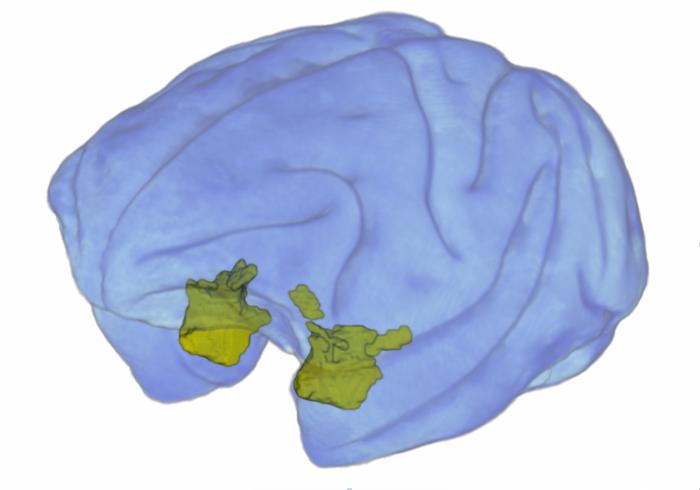The human brain is a complex organ with intricate structures that govern our emotions and decision-making processes. Among these structures, the amygdala stands out as a pivotal center for processing emotions, especially in relation to decision-making under uncertainty. Recent research conducted at the German Primate Center has shed light on how neurons in the amygdala crucially influence our understanding of probability and risk, which in turn informs our choices. This groundbreaking study, centered on rhesus monkeys, explores the neural mechanisms behind evaluating rewards, weaving a narrative about how these insights could pave the way for better understanding human behavior and mental health.
In this study, led by Raymundo Báez-Mendoza, notable findings have emerged regarding the role of the amygdala in interpreting visual cues that signify the probabilities and magnitudes of potential rewards. With the use of advanced techniques, researchers monitored the neural activity of individual amygdala neurons while the monkeys engaged in decision-making tasks. They discovered that these neurons are capable of translating complex signals about rewards into assessments of risk, a mechanism critical for navigating uncertain environments.
To effectively illustrate the team’s findings, the researchers employed an experimental framework that required two trained rhesus monkeys to perform tasks while receiving rewards in the form of juice. The monkeys stared at visual indicators on a screen which conveyed essential information regarding reward probabilities and magnitudes. Researchers utilized microelectrodes to capture and analyze the activity of neurons in the amygdala, providing unprecedented insights into this often-overlooked region of the brain during complex decision-making.
This exploration led to observations that many amygdala neurons represent reward probabilities in a manner detached from the visual signals used in the experiment. This abstraction indicates that the amygdala is adept at processing these parameters regardless of their stimulus representation, whether they arise from visual cues, sounds, or any contextual signals. This discovery underscores not only the importance of the amygdala in reward-based decisions but also its inherent flexibility in interpreting diverse forms of information.
Further analysis unveiled a fascinating dynamic within these neural processes. The researchers learned that the processing of reward probability often preceded assessments concerning the magnitude of said rewards. In practical terms, this means that as the brain evaluates options, it first considers how likely a reward might be before weighing how much the reward will be. This sequential processing allows for a more nuanced understanding of risk and reward, underscoring how primates—including humans—can adaptively respond to changing conditions in their environments.
The study also probed deeper, revealing neurons that specifically gauge risk. Risk encompasses the uncertainty associated with reward magnitude, and understanding this uncertainty is critical for making informed decisions. The team found that some neurons actively integrated information regarding both the probability and magnitude to formulate an understanding of risk. This ability reflects a sophisticated cognitive feature, suggesting that our brains are hardwired to evaluate and judge potential outcomes constantly.
The effects of these findings resonate beyond the academic realm, as they touch upon vital aspects of mental health. Understanding the mechanisms by which the amygdala processes rewards and their associated risks could illuminate various mental health issues, including anxiety and depression. Disruptions in amygdala functions might lead to flawed perceptions of rewards and risks, contributing to the psychological challenges many individuals face. Thus, exploring these neural mechanisms deepens our comprehension of how emotional processing can influence mental well-being.
This research is a significant step forward for neuroscience, intended not only to advance our understanding of animal behavior but to also inform potential interventions in human mental health. The findings underscore how the amygdala not only plays a role in emotional regulation but also in complex decision-making that weighs both potential rewards and the associated risks—illustrating the intricate interconnections within the brain.
The exploration of the amygdala’s neural networks highlights the potential for developing strategies to assist in mental health treatments. The concept that neurons in this region can influence our evaluations of probability and risk prompts new avenues for therapeutic interventions, potentially helping those suffering from anxiety disorders understand and mitigate their experiences regarding uncertainty and reward.
As the scientific community continues to explore the implications of this research, the links established between neural activity in the amygdala and broader psychological phenomena promise to provide substantial insights. The interplay between decision-making, emotional responses, and mental health could eventually lead to improved therapeutic approaches, ultimately enhancing the quality of life for those affected by mental health disorders.
This line of research holds promise not only for scientists seeking to unravel the mysteries of the brain but also for clinicians striving to devise effective treatments for psychological ailments. As we further our understanding of the amygdala’s functions, society may benefit from enhanced methods of addressing challenges related to mental health, a significant concern in today’s world.
In summary, the study of the amygdala’s role in processing probability, reward, and risk offers a fertile ground for future research and application. The potential for translating these findings into real-world solutions will be a critical focus moving forward, ultimately aiming to improve mental health outcomes and deepen our understanding of the intricate workings of the human brain.
Subject of Research: Animals
Article Title: Dynamic coding and sequential integration of multiple reward attributes by primate amygdala neurons
News Publication Date: 1-Apr-2025
Web References: 10.1038/s41467-025-58270-y
References: N/A
Image Credits: Igor Kagan – Deutsches Primatenzentrum GmbH
Keywords: amygdala, decision-making, probability, risk assessment, mental health, neuroscience, emotional processing




